Changing Uganda’s Public Health Landscape One Flash Mob at a Time

Public Health Ambassadors Uganda conducts a mobile drive to let communities know where they can receive sexual and reproductive health information and services in Luwero District, Uganda. Photo: Public Health Ambassadors Uganda
In 2011, a group of Ugandan public health students at Kampala’s International Health Sciences University began learning to salsa dance in their free time. When they mastered salsa, they learned other dances, over time becoming some of the best dancers in Kampala. In a small room on campus, across the courtyard from the hospital where their classes were held, these students escaped the stresses of school and city life by losing themselves in Uganda’s dreamy beats. The music and dance were intoxicating, the energy infectious.
When the aspiring public health practitioners began working on initiatives to raise awareness about critical health issues like contraception and HIV/AIDS in local communities, they knew music, dance, and performance art would attract the attention they sought. Six years later, this informal group of amazing dancers and dedicated students has matured into Public Health Ambassadors Uganda (PHAU), a respected and rapidly growing youth-led public health organization that uses music, dance, poetry, and drama to communicate health messages and connect communities with vital sexual and reproductive health information, services, and products.
On 13th February 2015, Public Health Ambassadors Uganda commemorated International Condom Day with their #CondomAreCool campaign with support from AHF Uganda Cares. PHAU distributed more than 77,000 condoms during the "Because I Wrap It" Flash Mob at Ham Shopping Grounds along Nakivuubo place road.
I met PHAU founder Segawa Patrick in Bali, Indonesia, when I interviewed him for the Family Planning Voices initiative at the International Conference on Family Planning in early 2016. Several months later at the Women Deliver conference in Copenhagen, Denmark, I watched as Patrick organized and led an international flash mob — a focal point of the conference and one of PHAU’s signature approaches to public health messaging. As dozens of young people from around the world danced through the convention center in Copenhagen, my colleagues at the Knowledge for Health (K4Health) Project and I knew that PHAU was an organization we wanted to get to know. In late 2016, we flew to Kampala to share storytelling and knowledge management techniques and learn more about PHAU’s unique approach to entertainment education, or “edutainment,” for public health.
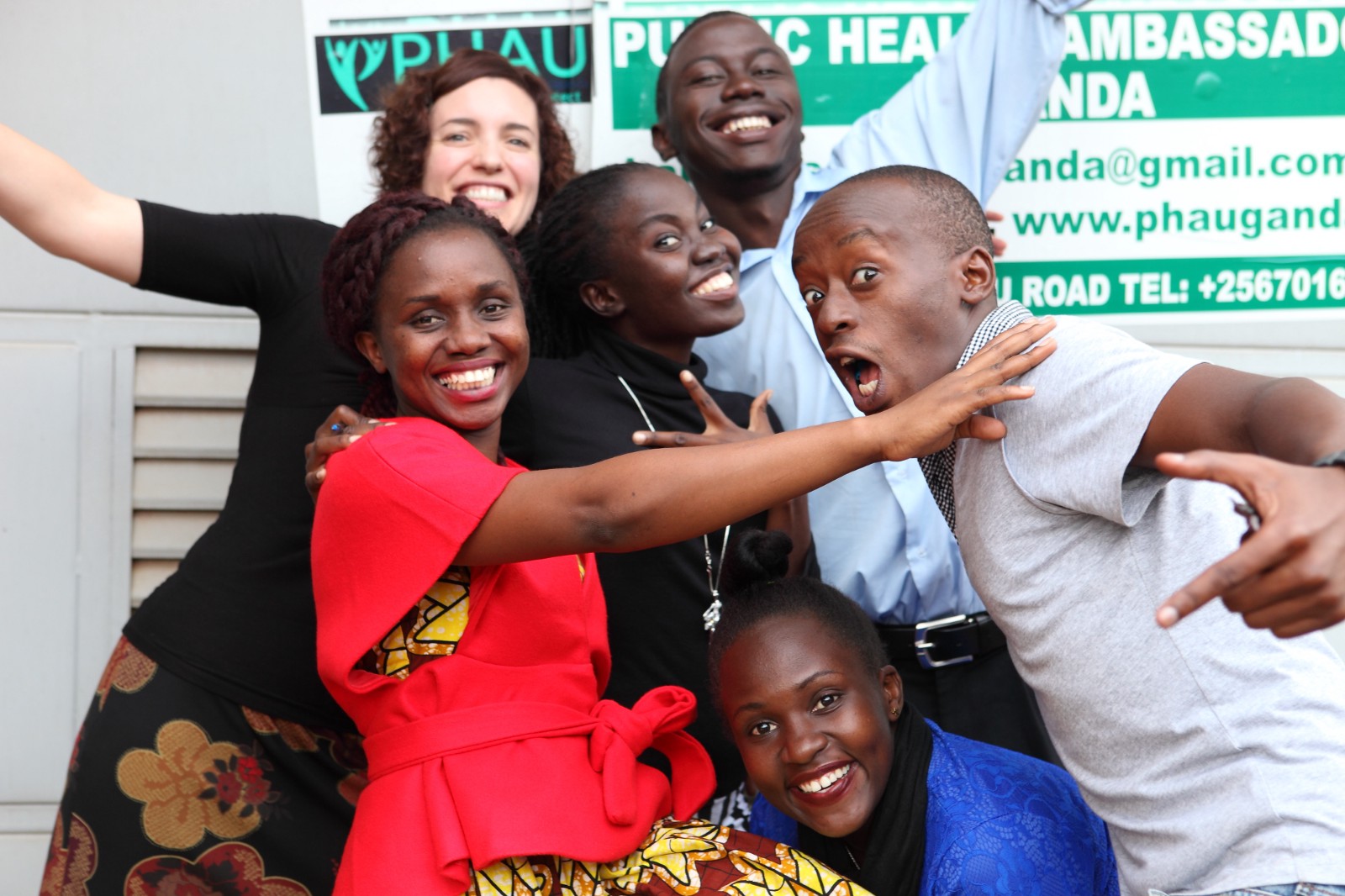
I was warmly welcomed to Kampala by Public Health Ambassadors Uganda staff. Clockwise, from top left: Elizabeth Futrell(me), Amase Diana, Kasaija Joseph, Segawa Patrick, Guntesse Catherine, Gimugu Daphne. Photo: David Alexander, CCP/Family Planning Voices
Public Health Ambassadors Uganda has focused their boundless energy on addressing several pressing sexual and reproductive health issues in Uganda: menstrual hygiene management, the lack access to which contributes to millions of school absences in Uganda each month; HIV and AIDS, which afflicts 7% of Uganda’s adult population; and access to contraceptive information and services, a pressing need in a country whose fertility rate is nearly six children per women and whose maternal mortality rate is 24 times that of the U.S.
Whatever the health issue, common threads in PHAU’s work include passion, creativity, and an uncanny ability to connect with their young audiences. After all, the oldest person on PHAU’s staff is in his early thirties, and the majority of the PHAU staff are in their mid-twenties. During our visit, I watched their youthful energy, magnetic personalities, and knowledgeable professionalism attract community members of all ages to the health information and services they were offering. In the short amount of time they’ve been operating, they’ve made a difference in thousands of lives, and they’re just getting started. Here, six Public Health Ambassadors Uganda staff members tell their story.
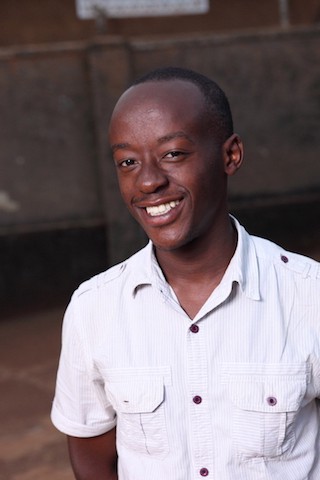
Segawa Patrick, Founder and Program Coordinator, Public Health Ambassadors Uganda (PHAU). Photo: David Alexander, CCP/Family Planning Voices
Patrick: I have three sisters, and I was raised by a single mom. It’s a big source of motivation that I have to make sure I work hard and support them, especially those young sisters of mine — make sure that they finish school and they have better opportunities as well so that they can take care of themselves…. We have a strong focus on young women and girls, in terms of reaching them with the right information on sexual and reproductive health and HIV…. If you find a 15-year old engaging in risky sexual behaviors, then it rings a bell that even your sister who is just 15 could be going through the same.
Diana: My brother died of HIV, but we did not know until we grew up, and then they told us, “Ok, yeah, he died of HIV.” There was a time when we were in school, and he was bedridden — that was in 2002, actually. We were still very young, and they brought us from school, because they wanted us to see how HIV kills. It was such a painful thing. We did not know the disease, but afterward, they told us, “If you mess up, that’s how you will end up.”
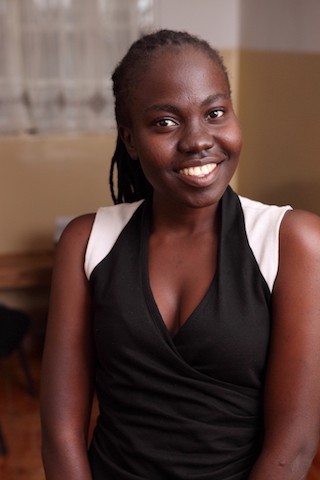
Amase Dianahritah, Project Officer and Administrator, PHAU. Photo credit: David Alexander, CCP/Family Planning Voices
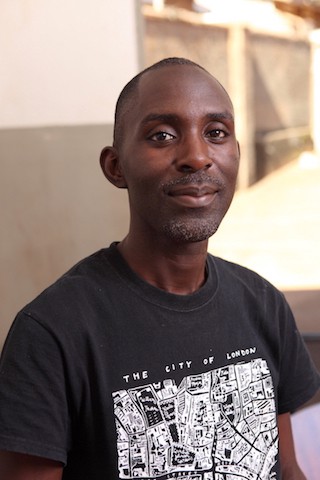
Mubuuke Felix, Monitoring and Evaluation Consultant, PHAU. Photo credit: David Alexander, CCP/Family Planning Voices
Felix: I come from a humble background. Most of what I am doing is shaped by what my home setting is or was. My father is a judge. My mother is a midwife, so there was a mixture of careers at home. My simple story was that our home had two mothers and so many children in that home. We were forced to be able to survive for the fittest, meaning whatever resource was available had to be shared by so many of us, and we had to ensure that we struggle to become persons of importance in the future…. Today I don’t have so many children from my home or from my body, because I don’t have so much to share. That’s why I advocate for family planning, and I also advocate for healthy families…. If you don’t have so much in your home, you can use the little that you have in your home to make you better and make you also be able to better your future family. Simple as that.
Joseph: I was a peer educator while I was still in college. People still call me from my college for information about sexual and reproductive health. They always tell me, “When are you bringing us condoms?”… At college, people have a lot of sex. Many of them have unprotected sex. For example, when they’re coming from clubs, having fun, sometimes they are too drunk or too tired. They just pick up a girl and go back home, and in the morning, they are like, “Oh my God, what happened?” … They’ll call me like, “Hey, where are you?” They meet me, and we talk.
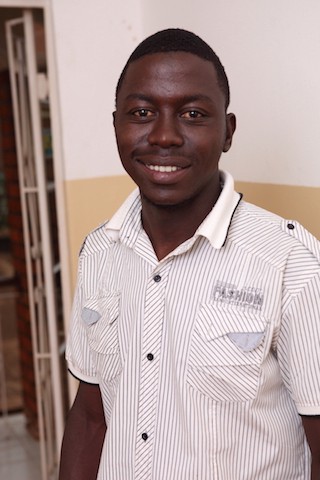
Kasaija Joseph, Program Manager, PHAU. Photo credit: David Alexander, CCP/Family Planning Voices
Patrick: I studied at International Health Sciences University in Kampala, and I was very passionate about music, dance, drama. With a couple of guys who were my colleagues, we started a dance club. We were teaching people how to do salsa and Latino, those kinds of things. Usually we’d have classes on Wednesday, Thursday, and Friday. Guys would come after classes, you know, after those boring lectures, or on weekends when they have nothing to do, they come and they dance, you know, we sweat….
One time, we had a production at university. It was called The Twist. The Twist was a play that was focusing on sexual and reproductive health — in particular, issues of male involvement. Have you ever imagined what it would feel like if a man became pregnant? That was the “twist”! The other side: What if a man became pregnant? Because usually, in African settings, men love giving birth to boys. So he’s always on your case: “I need a boy. I need a boy.” Now, just imagine it’s your turn, asking him to give birth to a boy. We managed to incorporate that kind of acting, so we got the skills. We started mixing the dancing and the acting.With time, we started conducting community outreaches, using that component of music and dance.
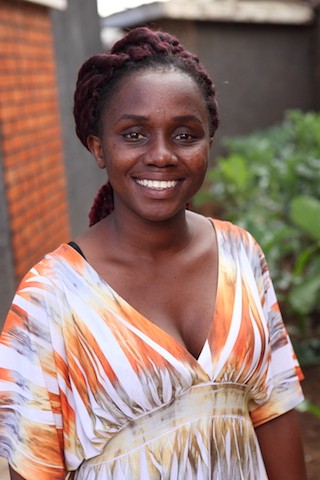
Guntesse Daphne, Program Manager, PHAU. Photo credit: David Alexander, CCP/Family Planning Voices
Daphne: We started with nothing. We were just students in school. But if we were able to come this far, I can only talk to the people out there who have this beautiful idea, and they have the knowledge of how they think it can be done, and they’re just afraid to bring it out because of resources. I can just tell them, “Go out there, work hard, and things will fall in place somehow. You just have to work hard and climb well and bring your idea to the table, and things will fall into place, and you’ll be able to impact a life.”
Diana: [When] I started, they just wanted to pay me not even a single cent. But I said okay, because I love it…. We cover just a little percentage — it’s just like a drop in the ocean, the people we reach out to. Uganda has over 100-something districts, but we work in only two districts. With the other one we just got, three districts. And in those three districts, there are very few people…. But every person matters, so we try as much as possible so that the world will be a better place.
Patrick: If you compare the time of inception, where we had only one grant worth $1,000 to a point where we have been about to attract funding from different international donors…at this moment I should say that the annual income for Public Health Ambassadors Uganda is up to around US$50,000, which is quite an impressive achievement since 2014. It’s just a span of two years, but there is a lot of growth that has taken place.
Felix: I’m the oldest staff of Public Health Ambassadors Uganda…. Our staff have exposure to projects, but they might not have experience reporting to different donors, so I love it most when I’m giving feedback after the day’s activity, after quarterly reporting, or after we have won proposals, when they are attentive and they are noting down a few issues that worked well for the project, for the activity, and, of course, the challenges.
Joseph: Being in the field is part of getting the chance to do what I love most. For example, I love being with young people. When I’m at the office, I’ll be doing the paperwork, but when I’m in the field, I get a chance to meet the people I love so much…. You can’t do behavior change when you’re just in the office. When I get a chance of going to the field, I get a chance to interact with people and try to find a way of enhancing them or influencing them to have positive behavior change for their health.
Ruth: We’ve conducted some outreaches, we’ve taught people how to use condoms, and we’ve distributed condoms to prevent STIs and unwanted pregnancies. I was shy at first because it is something that society looks at differently. They look at it as a private thing. So coming out to demonstrate causes questions. But they have to get the proper information so that they can use them properly. Doing it over and over again gave me the courage to continue doing it.
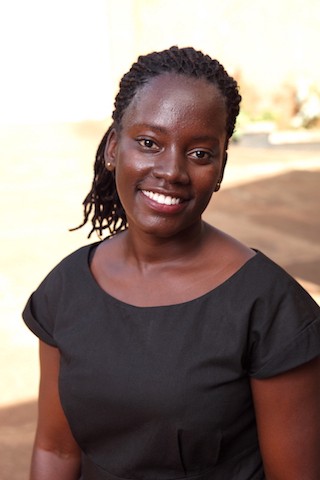
Kitzo Ruth, Program Manager, PHAU. Photo credit: David Alexander, CCP/Family Planning Voices
Felix: I used to accompany my mother to do her family planning visits. Back then, she had a job title of Village Health Team Member. She was given a bicycle, and she would carry me to accompany her to the villages, and we would find the women in the shade and the men, and she would talk about family planning, sex, and HIV…. I loved the way she talked to clients. Her talk didn’t stigmatize those who were positive. It would have those who haven’t yet gone for testing rush to go and test to be able to know what their status is. That has made an impact on me. When we were in Luwero for our outreach, several clients came out for a test but were scared of what the result would be. My info to them was, “It doesn’t matter if you’re positive today as long as you can live for tomorrow and be able to raise your children and be able to fulfill your plan.”
Daphne: There is a project called Ensonga, for menstrual hygiene management. And I cannot speak enough about Ensonga. I see these girls who go through what I go through, and I used to think it was just normal, but it is not.
Diana: I heard a story of a girl in some district in Uganda that was in Mukuno who said she in order not to buy those pads, she preferred to get pregnant for nine months to save that time. That hit me badly, and I was like, “Yeah, this is something to talk about.” … When you’re pregnant during the nine months, you’re not menstruating, so it’s like someone is saving [money] for the nine months instead of buying pads every month, every month.
Daphne: I listened to this one girl — she’s called Patricia…. Patricia lives with her grandma, and she has siblings who also live with her grandma…. Patricia told me, “You know, grandma struggles to put us in school, to make sure we have something to eat.” It was very hard to ask her for pads every single month. She was getting frustrated, because she wouldn’t ask her grandma, because her grandma did not have enough.
When her grandma couldn’t provide, she had to use cloth — pieces of cloth. And she has few clothes. What she has is precious to her, so cutting it to fend for this monthly thing that she knows is going to come back another month was frustrating to her. She didn’t know what to do. And, you know, the pieces of cloth she would get were not absorbent enough, so she would use them, but she wouldn’t be confident going out, so she would have to stay indoors or around home…. She said she flows for at least six days and at most seven. So she would miss a lot in school, because she said she would not go to school because she always stained — she always soiled her dress, her school uniform…. And it happens every month, so imagine you’re missing school seven days a month.
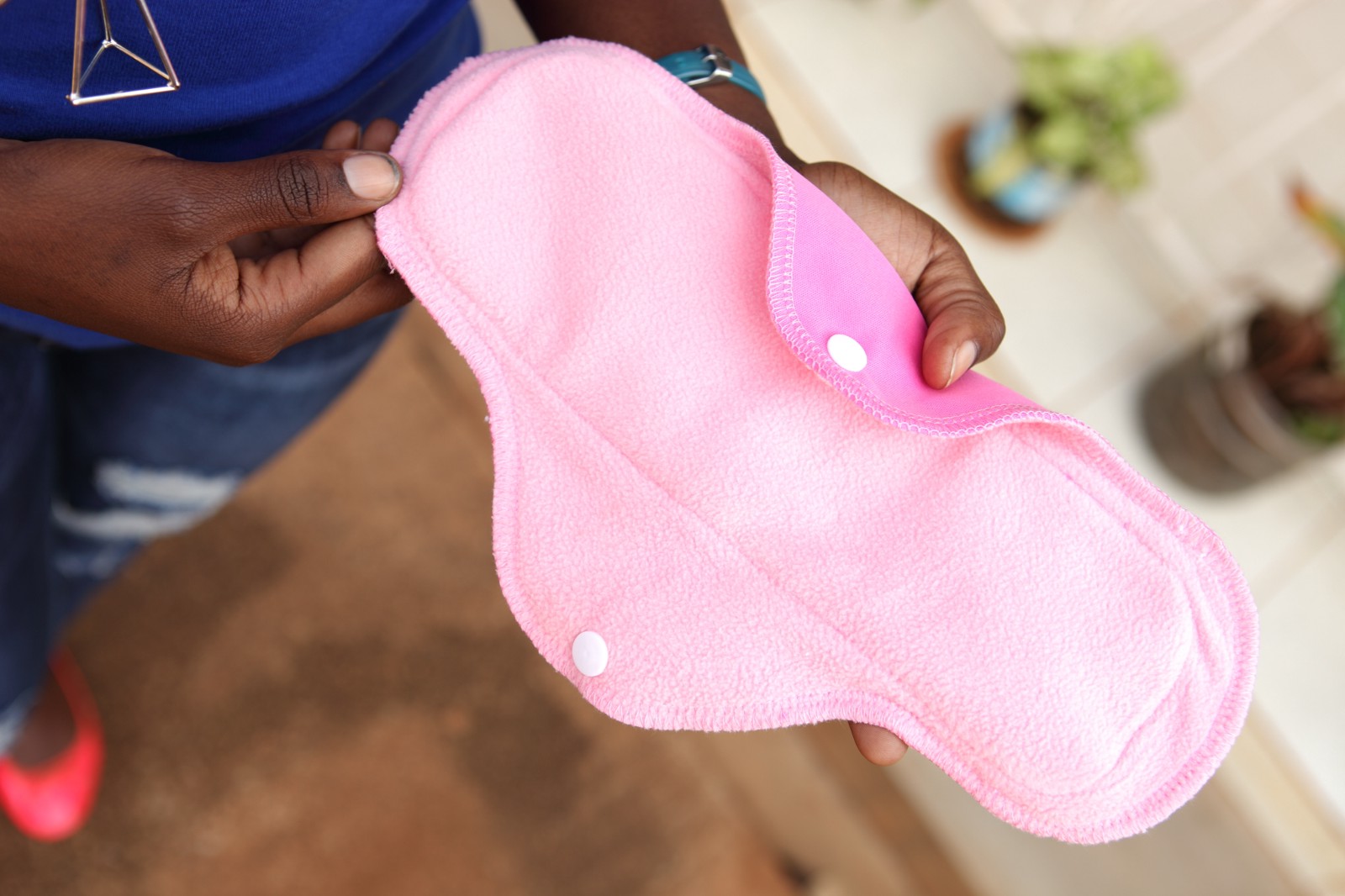
Reusable AfriPad. Photo courtesy of David Alexander, CCP/Family Planning Voices
You should have seen the smile on her face when she got [the AfriPads]. She was very happy. She kneeled down. In Uganda, we kneel down to show a sign of respect or appreciation. She kneeled, down, and we were like, “No, no, don’t kneel down,” because in school you don’t really have to kneel. But she kneeled down, and she was like, “Thank you very much,” and she was telling me how she was going to keep them, and how she was going to get somewhere to keep them safe, how this is a life-changer. And we only gave her a pack. It was a small token from us, but the smile we brought on her face — she had a lot of hope…. She knew she would continue in school without missing, and she knew her grades were going to get better instantly…. I saw the smile on her face, and I saw hope.
Patrick: One thing that I want people to know about Public Health Ambassadors Uganda is basically that whatever they see us do — we do it because we love it. We are passionate about it, and as public health practitioners, we always want to make a difference in the communities where we live. And we always want to leave an impact in a fun way. Not these conventional lectures or the normal status quo. We want to always do things in a unique but youth-friendly manner. We love what we do, and it’s what we have been doing that has given us various opportunities to reach where we are. It gives us reason to move. It has provided a sense of purpose…. I’ve never figured out what would I be doing if I wasn’t doing this.
This article was originally posted on The Exchange, a K4Health publication. The Knowledge for Health (K4Health) Project is supported by the United States Agency for International Development (USAID) Office of Population and Reproductive Health, Bureau for Global Health, under Cooperative Agreement #AID-OAA-A-13–00068 with the Johns Hopkins University.


